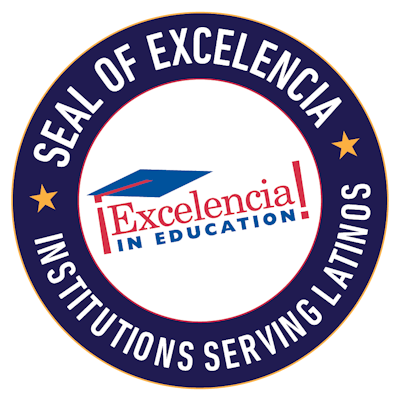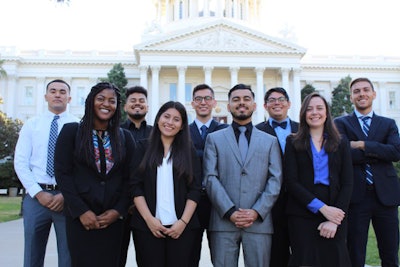Diverse: Issues In Higher Education and Excelencia in Education have partnered to exclusively release names of the institutions that have earned the 2020 Seal of Excelencia, a national certification that confirms an institution goes beyond enrollment to intentionally serve Latino students. The following school, California State University, Sacramento, is one of five institutions to earn the 2020 Seal of Excelencia. To learn more about the seal, visit https://www.edexcelencia.org/seal-excelencia-framework.
In creating programs to serve students who often have no supports, California State University, Sacramento (CSUS or Sacramento State) has changed the trajectories of many Latinx families.
Deborah A. Santiago, CEO of Excelencia in Education, says CSUS’ focus on Dreamers and migrant students stands out on this very diverse campus.

When assessing the impact of CSUS’ programming, people need to look no further than the person overseeing much of that programming, says Dr. Viridiana Diaz, associate vice president for strategic student support programs at CSUS. As an undergraduate, she participated in the College Assistance Migrant Program (CAMP), a federally funded program designed to help students from migrant and seasonal farmworker backgrounds succeed at CSUS.
“For me to oversee the CAMP program, when they’re the ones who recruited me out of high school and provided me with the support that I needed through my undergrad, is full circle for me,” Diaz says. “Now I create programs and services that serve people that I can very much connect with and understand.
“It’s reassuring to help students that typically don’t have these opportunities to advance their lives, and, by doing that, transforming their families and communities,” she adds. “The people at Sac State are incredibly invested and personally committed to the work that they do.”
Campus engagement
“The Seal of Excelencia reinforces our commitment in a public and national way,” says Diaz. “Our institution and particularly our president have prioritized becoming a caring university. It’s always been about truly caring about the wellbeing of our students in a very holistic way.”
With approximately 34% of its student body identifying as Latinx — freshmen through graduate students — the Latinx population is the largest ethnic group on a diverse campus. In his address to open the fall semester, Dr. Robert S. Nelsen, CSUS’ president, emphasized the importance of eliminating racial bias on campus and creating an anti-racist environment.
Nelsen, president of CSUS since 2015 (the year CSUS became an HSI), says a university has a moral responsibility to believe in all of its students.
 Dr. Viridiana Diaz
Dr. Viridiana Diaz“If we do not see our world and their world through a lens of equity; if we do not adopt equitable practices, our educational mission will fail because our students won’t succeed and won’t graduate in a timely fashion without the debt that comes from spending too many semesters in the classroom,” he says.
Embedded within CSUS’ overall recruitment strategy is an understanding of the importance family plays in Latinx students’ decision-making.
“We work closely with families by offering Spanish-speaking and culturally relevant presentations in schools and in the community as well as offering family-oriented on-campus programming,” says Diaz.
“In 2018-2019, Sacramento State conducted approximately 500 school and community presentations, hosted 300 on-campus fieldtrips and welcomed over 10,000 Spanish-speaking students and parents to our campus,” she adds. Issues important to Latinx families, such as housing arrangements and having elements of a home environment, are taken into consideration.
CAMP is funded to serve incoming freshmen. It conducts extensive outreach to rural communities, and staff members make direct contact with Latinx students and their families through bilingual presentations in schools and at community events. These presentations focus on the admission process, the benefits of pursuing higher education and parental support. Each year, CAMP directly serves about 80 students; approximately 98% of these students are Latinx.
In addition to its own programming, CSUS partners with community organizations. Univision 19 hosts Feria de Educación, an educational fair that introduces Spanish-speaking high school students and their families to information and resources. Univision also partners with CSUS on disseminating information.
“We’re able to speak with our Spanish-speaking community through media,” Diaz says. “We start educating the community on what students need to have ready when making an application.”
Student success programming
While many campus programs are designed to meet the needs of a range of underserved populations and don’t specifically serve Latinx students, CSUS still manages to effectively impact Latinx students.
“They feel they can serve all the diverse groups and they can also disaggregate and show how they’re serving them individually,” says Santiago. “That really stood out to us because that’s a way to show influence and impact and that you know who you’re serving.
“Each program is unique, but that ability to know who you’re serving in the students and creating a sense of belonging — that matters for students of color overall, especially when you think of higher education as being so traditional and not inviting, and the onus is on the student to transform to be successful.”
There is definite attention on specific ways to impact the Latinx community.
“We look at areas where Latinx students are not represented,” Diaz says. “We prioritize our services, supports and outreach to ensure that Latinx students are pursuing those careers. Also, creating community for Latinx students in those fields.”
For example, Latinx students are underrepresented in criminal justice, engineering and the sciences.
“The Law Enforcement Candidate Scholars (LECS) is an educational and professional pre-academy program for students interested in a career in law enforcement,” says Diaz. “LECS works with local and state law enforcement agencies to provide academic, career and leadership development and to prepare diverse students to become sworn law enforcement officers.”
MESA Engineering Program (MEP) supports underrepresented students in engineering, computer science and construction management programs. MEP activities include a five-week summer math boot camp for incoming freshmen, workshops on tools and strategies for academic success, scholarships, an emergency loan fund, tutoring and group study sessions.

Psychological and counseling services are available in several locations, not just the Health Center, making it easier for students to access.
“This model acknowledges the negative perception around psychological services that exists in many Latinx communities and demystifies psychological services as a necessity to overall wellbeing,” Diaz says.
CSUS has several spaces where Latinx students can connect and build community. These include the Serna Center (focusing on civic engagement), the Dreamer Resource Center, the Multi-Cultural Center, the PRIDE Center, the Women’s Resource Center, the Full Circle Project and the Martin Luther King Jr. Center.
“Latinx students can build long-term social connections and they can experience elements of their home environment, language and culture,” Diaz says. “That helps with a sense of belonging and retention.”
Moving forward
Latinx students had an 8.8% four-year graduation rate in 2016 and a 20.7% four-year graduation rate in 2019. The six-year graduation rate rose from 48.1% in 2016 to 49% in 2019.
Diaz says CSUS is proactive about diversifying its faculty and staff. The university has received grants to enable additional outreach for difficult-to-fill positions. Anti-bias training is integrated into the search process, and diversity officers have input throughout the search process. There is ongoing professional development for faculty.
CSUS has more than 15 peer-support programs that help students succeed academically and persist to graduation. Latinx students receive individualized support in academic advising, career counseling, tutoring, financial aid/scholarship matters and leadership development in spaces designed to have a familial feeling with trained Latinx student peers.
The Dreamer Resource Center offers services for undocumented students, including no-cost immigration consultations open to students and their families. Career Tracks provides career counseling and prepares students to successfully transition to the workforce.
“INSPIRE Peer Programs are a network of student-to-student support programs that maximize collective impact to increase the number and proportion of Latinx and high-need students who are successful at Sacramento State and attain timely degree completion,” says Diaz. “INSPIRE Peer Programs encompass academic support, mentoring and advising. In 2018-2019, 58% of the students participating were Latinx.”
CSUS has supported students throughout the COVID-19 pandemic, with programming taking place virtually. There is even programming in Spanish for parents on how to best support students as they take classes online.
“We are supporting our Latinx students and providing them opportunities for leadership and service,” says Nelsen. “We are closing the achievement gap — what is better called the opportunity gap — and creating the next generation of leaders.”
This article originally appeared in the October 1, 2020 edition of Diverse. You can find it here.















